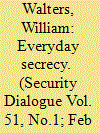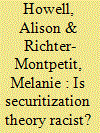|
|
|
Sort Order |
|
|
|
Items / Page
|
|
|
|
|
|
|
| Srl | Item |
| 1 |
ID:
173882


|
|
|
|
|
| Summary/Abstract |
Despite the welcome turn within security studies towards a more material- and practice-oriented understanding of state secrecy, the ways in which security actors experience, practise and negotiate secrecy in their everyday work lives has been rather overlooked. To counter this neglect the article calls for attention to everyday secrecy. Focusing on a former top-secret weapons research facility in the UK called Orford Ness, it uses oral history to give an account of ex-employees’ memories, experiences and practices concerning secrecy. Such a focus reveals that subjects make sense of procedures and rules of secrecy in ways that are sometimes surprising and unexpected. Ultimately this perspective emphasizes that secrecy is not just what governments and organizations prescribe and proscribe; it is also shaped by subjects who negotiate these rules. Everyday secrecy matters: as a perspective it shows that secrecy is not simply imposed by states and organizations from ‘above’; it is also made from ‘below’, albeit very asymmetrically.
|
|
|
|
|
|
|
|
|
|
|
|
|
|
|
|
| 2 |
ID:
173879


|
|
|
|
|
| Summary/Abstract |
This article provides the first excavation of the foundational role of racist thought in securitization theory. We demonstrate that Copenhagen School securitization theory is structured not only by Eurocentrism but also by civilizationism, methodological whiteness, and antiblack racism. Classic securitization theory advances a conceptualization of ‘normal politics’ as reasoned, civilized dialogue, and securitization as a potential regression into a racially coded uncivilized ‘state of nature’. It justifies this through a civilizationist history of the world that privileges Europe as the apex of civilized ‘desecuritization’, sanitizing its violent (settler-) colonial projects and the racial violence of normal liberal politics. It then constructs a methodologically and normatively white framework that uses speech act theory to locate ‘progress’ towards normal politics and desecuritization in Europe, making becoming like Europe a moral imperative. Using ostensibly neutral terms, securitization theory prioritizes order over justice, positioning the securitization theorist as the defender of (white) ‘civilized politics’ against (racialized) ‘primal anarchy’. Antiblackness is a crucial building-block in this conceptual edifice: securitization theory finds ‘primal anarchy’ especially in ‘Africa’, casting it as an irrationally oversecuritized foil to ‘civilized politics’. We conclude by discussing whether the theory, or even just the concept of securitization, can be recuperated from these racist foundations.
|
|
|
|
|
|
|
|
|
|
|
|
|
|
|
|
| 3 |
ID:
173880


|
|
|
|
|
| Summary/Abstract |
The term ‘political ethnography’ has been used to describe a recent trend whereby political scientists, including scholars of security studies and international relations, increasingly deploy fieldwork to explore a variety of political arenas. This article challenges a one-dimensional understanding of political ethnography that sidelines the politics activated in an ethnographic research process and instead calls for political ethnographers to self-reflectively analyse their own positionality in terms of imperial complicity. It discusses experiences of researching counterinsurgency practices in southern Thailand and outlines different dimensions through which counterinsurgents positioned the author as a ‘military mascot’. These include assumptions about the Western and Christian identity of the researcher as well as ideas about the author’s ability to produce objective ‘facts’ in reporting a presumably peaceful military mission. The article concludes by reflecting on the problematic alliance between political science and imperial military projects of counterinsurgency, arguing that the lack of discussion about this affinity constitutes one of the conditions that facilitate the ‘mascotting’ of political ethnographers with military interlocutors.
|
|
|
|
|
|
|
|
|
|
|
|
|
|
|
|
| 4 |
ID:
173883


|
|
|
|
|
| Summary/Abstract |
State secrecy is incompatible with the values of liberal democracy if there is no publicly reasonable justification for the concealment. So how can a liberal democracy continue to keep state secrets amidst suspicion that no such justification exists or that, worse, those secrets contain evidence of wrongdoing? This article maps and critiques the justificatory strategies that were used by the British state to refuse to disclose secret material related to the 2003 Iraq War, despite widespread accusations of hidden deception and illegality. Through an analysis of the legal discourse that underpins freedom of information (FOI) and disclosure protocols, the article shows how the law regulates disclosure through a metaphorical ‘balance’ of public interests. This balance, however, is no balance at all. It is profoundly one-sided because security only features on one side. The law explicitly recognizes that disclosure can create insecurity for public interests, but lacks any recognition of the opposite: the insecurity of secrecy. Rather than security trumping liberal values, this law allows enduring secrecy to be framed, paradoxically, as a means to secure liberal democratic accountability. The significance of this claim is far-reaching as FOI laws in many other countries employ a similar harm-based, one-sided justificatory strategy.
|
|
|
|
|
|
|
|
|
|
|
|
|
|
|
|
| 5 |
ID:
173881


|
|
|
|
|
| Summary/Abstract |
The Nasa indigenous group’s Guardia Indígena, whose primary goal is to protect indigenous people and their territories from all types of armed groups, is a nonviolent self-protection organization in Northern Cauca, Colombia. On 5 November 2014, while peace talks were ongoing between the Revolutionary Armed Forces of Colombia (FARC) and the Colombian government, two Guardia Indígena members were shot dead by FARC guerrillas. Without guns or physical violence, indigenous guards captured seven guerrillas responsible for the crime, and, four days later, indigenous organizations held a trial and sentenced the rebels to imprisonment. This article describes those events and investigates how the unarmed guards managed to capture the guerrillas and bring them to trial. The self-organization concept is used to gain insights into the mechanisms and strategies deployed. The mechanisms of the Guardia Indígena include constructing and applying specific social norms and values, developing a common goal, and applying a flexible mix of centralized and decentralized ways of organizing. By combining and activating these mechanisms at carefully chosen moments, indigenous people have succeeded in organizing themselves as a collective movement that is powerful enough to confront armed groups without using violence.
|
|
|
|
|
|
|
|
|
|
|
|
|
|
|
|
|
|
|
|
|